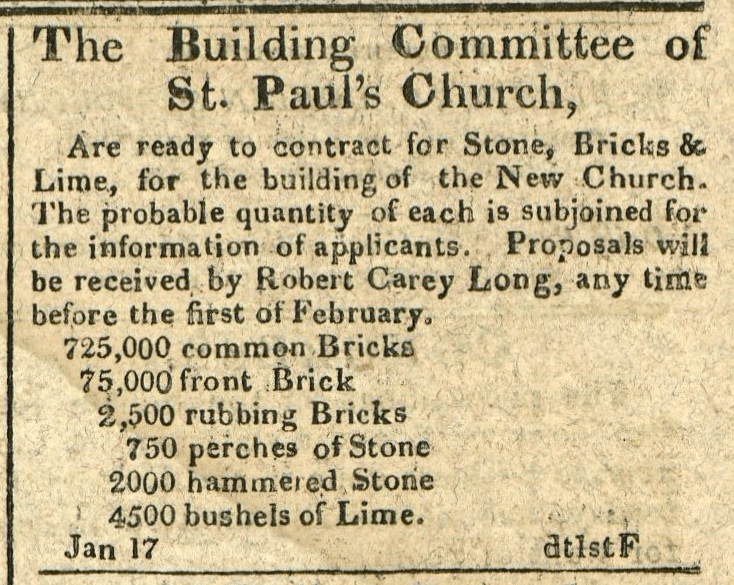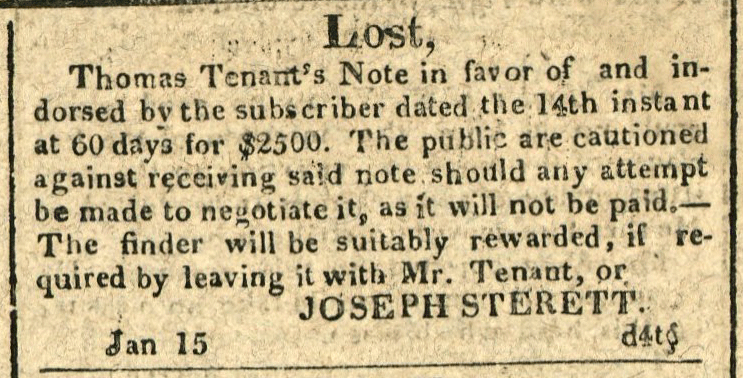
Monthly Archives: January 2014
On January 16, 1814, Charles Carroll of Carrollton wrote to his son-in-law Robert Goodloe Harper. His letter rejected Baltimore’s burgeoning optimism for a quick end to the war with England:
“Till Bonaparte is defeated so as to be forced to relinquish all his conquests and to make peace, or what would be more desirable till death rids the world of the tyrant, I am persuaded no peace will take place between this country and England.”
Carroll retired from public life in 1801—a public life that included signing the Declaration of Independence in 1776 and nearly 20 years in the Maryland State Senate. Retirement did little to slow Carroll’s correspondence. He spent the winter of 1813-1814, living at Doughoregan near Ellicott City and wrote often to Harper worrying over the mismanagement of his farm near Annapolis and the events of the war.
Source: Rowland, Kate Mason. 1898. The Life of Charles Carroll of Carrollton, 1737-1832: With His Correspondence and Public Papers. G.P. Putnam’s Sons.
16th Sunday – Rain’d all Night, but clear’d up at sunrise, Wind N.W. – Staid at Home, no company at dinner. P. Wirgman call’d in the evening – The Snow has dissolv’d much today
From the journal of Captain Henry Thompson, January 16, 1814. Courtesy the Friends of Clifton.
January 9-15: “Cloudy morning,” a “book of designs” for the Washington Monument, and Baltimore at Sea
Subscribe to receive our weekly updates by email or check out our review of stories from January 9-15, 1814 on the Baltimore Heritage blog.
On January 15, 1814, Ramsay McHenry was born to Daniel William McHenry and his wife Sophia Hall Ramsay. The child was the first grandson of Fort McHenry namesake James McHenry, a Revolutionary War veteran who served as a personal secretary to General George Washington and as the nation’s first Secretary of War. James McHenry had poor health throughout his life and, in early 1814, experienced a serious paralysis from which he never fully recovered:
“Though he was but little over sixty years of age McHenry’s health which had never been robust was entirely shattered by his attack of paralysis and from the beginning of 1814 he was almost a helpless invalid.”
Ramsay McHenry lived in Harford County up until his death on August 13, 1878. He served several terms in the state legislature, “took a great interest in agriculture and possessed fine herds of imported cattle,” and never married.
Source: Steiner, Bernard Christian. 1907. The Life and Correspondence of James McHenry: Secretary of War Under Washington and Adams. The Burrows Brothers Company.
15 – Cloudy morning Wind South – Went to Town & rode to dine with D.A. Smith & a small party, commenc’d raining at 5 O’Clock& has not ceas’d at bed time – Had three Lambs last Night
From the journal of Captain Henry Thompson, January 15, 1814. Courtesy the Friends of Clifton.
Advertisement: Lost, Thomas Tenant’s Note

Joseph Sterett (1773-1821) was a wealthy land-owner, merchant and planter who commanded the Fifth Regiment of Maryland militia at the Battle of Bladensburg and Battle of North Point. Thomas Tenant (1769–1836 was a Federalist, a Baltimore merchant, shipowner, wharf owner, and prize agent who served as a major in the Sixth Regiment of the Maryland militia.
How did Sterett lose a $2500 check from Tenant? Share your theories in the comments!
14 – Very fine day & rather more mild – went to Town, retun’d to dinner with Jn. Moore. Mr. Vanwyck & S. Sterrett who return’d home before Sunsett Two Lambs last Night & two today
From the journal of Captain Henry Thompson, January 14, 1814. Courtesy the Friends of Clifton.
Advertisement: Rumour upon Rumour or one good chance for speculation Yet left.
13th – Weather continues clear & cool – Went to Town, din’d at P. Wirgmans who had a Family party – Ram Lamb last Night –
From the journal of Captain Henry Thompson, January 13, 1814. Courtesy the Friends of Clifton.
